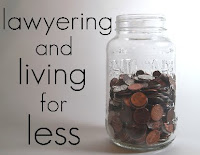Below is my monthly post for Ms. JD. I accidentally neglected to post last month's column, so for information on how to start a firm or a small business on a budget, click here.
Computers are huge office energy-hogs. Merely shutting down computers, printers, fax machines, and the like when you leave for the day can have a huge impact on the electrical bill (if your network runs updates during the night, turn off monitors and other non-essential electronics). When you power down, make sure you're really powered down: most electronics continue to pull energy from outlets even when shut down, so by plugging them into a power strip and switching that off, you'll save even more. Optimize your computers for energy savings by taking full advantage of the screen saver and sleep modes, and look into buying energy star models the next time you're in the market for a new batch of computers (better yet: replace desktops with laptops, which can use a staggering 90 percent less energy).
Heating and cooling systems can also drive an energy bill sky-high. By regulating these systems closely and working with nature (close blinds when it is hot out, open them when it's cool), you can save a substantial sum. For your office lighting, replace standard light bulbs with compact fluorescents (just make sure to recycle them!) and look into LED desk lamps. Install motion sensors for rooms that aren't used as often, such as conference rooms or even restrooms.
When it comes to paper waste, the idea is simple: use less paper, buy less paper. We're fortunate to live in a time when almost everything is or can be digital, so email instead of mail, and keep and review files and documents on the computer. If something must be printed, format your printer to print on both sides of paper (which will also mean less pages and savings on mailing costs). Use drafts or extra copies to make your own scrap paper booklets, reducing the need for legal pads. And when you receive a shipment, save and reuse the shipping boxes.
Whether you work in a big city or a small town, the commute to work is rarely fun, and usually costs a significant amount of money in gas and parking costs. Look into public transportation or carpooling, or get your exercise by biking or walking to work. Instead of working five eight-hour days, try to work four ten-hour days, and enjoy a three-day weekend every week! Better yet, ask about working from home. As an attorney, you will inevitably have client meetings and court appearances that will inhibit this, but even skipping the commute one day each week can have a huge impact, and with technology such as email, instant message, video chat, document sharing, and the like, telecommuting has never been easier.
Make sure your office kitchen (if you're so lucky) is stocked with reusable plates and cups to avoid buying disposable and to save money on meetings and birthday parties. Also, if you plan to order take out for lunch or during that late night trial prep, order it with coworkers for reduced cost and packaging waste.
These tips just scratch the surface. There are hundreds of ways to save money in your home or office by reducing your impact on the environment. If it seems overwhelming, think about designating a member of the office team as an energy manager or a transportation coordinator. There is likely to be someone who is more than willing to take on the challenge.





1 comments:
I love the idea of saving money while doing our part.
The other day I looked at my bottles in the recycling and thought I could reuse them as jars or display cases.
I ended up converting my 360 Vodka bottles into show cases for old dismanteled jewlery, flowers and old coins.
It looks unique - love it!
Post a Comment